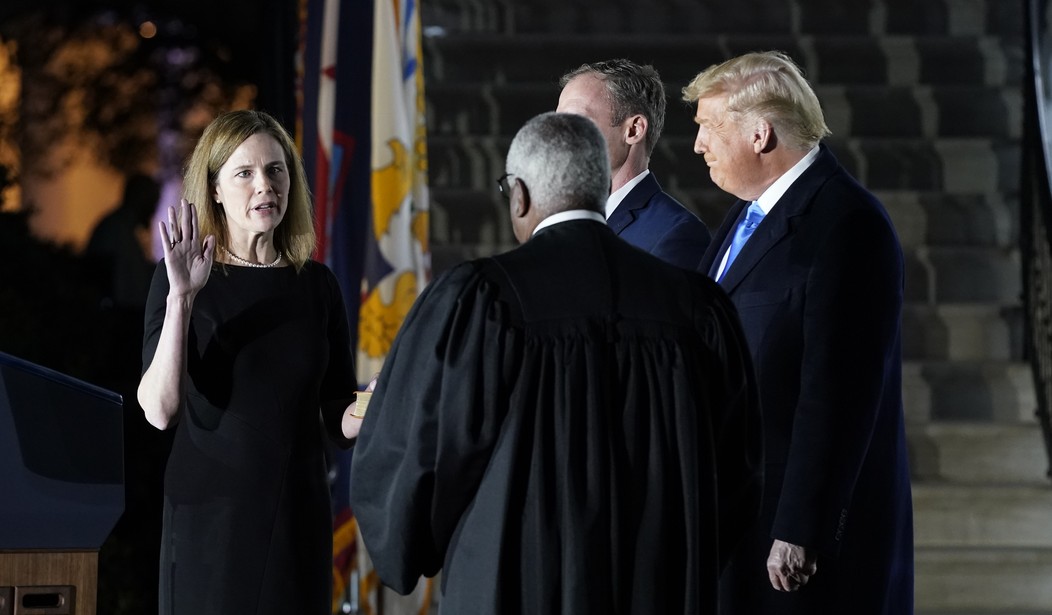Political commentary has lately dedicated considerable coverage to the notion of “court-packing.” This focus has come because of a radical liberal push to expand the number of seats on the Supreme Court should Democrats take control of the Senate and White House on November 3, in addition to maintaining their current House majority. Democrat presidential hopeful Joe Biden first refused to say whether he would pack the Supreme Court, but now a new phenomenon has arisen.
Recently, Democrats and liberal groups, following Biden’s direction, have attempted to alter the meaning of the term “court-packing.” They claim under some twisted and dishonest redefinition that merely filling vacant seats on courts, such as that on the Supreme Court of the late Justice Ruth Bader Ginsburg, is packing the courts.
Until very recently, court-packing had a widely understood meaning. In 1937, President Franklin Delano Roosevelt grew frustrated by a series of Supreme Court rulings that had invalidated as unconstitutional a slew of his New Deal programs. In response, he proposed adding six justices to the Court—one each for any justice over the age of seventy—in order to expand the Court to fifteen justices. FDR was at the height of his power and had the benefit of having overwhelming Democrat majorities in both the House and the Senate. His court-packing plan, however, ran into stiff opposition. The Senate rejected it by a margin of 70-20. Not even a quarter of the Senate was willing to support this reform. That is because, since 1869, the Supreme Court has had nine justices, and Congress knew in 1937 what we know today: that number should stay at nine. The late Justice Ruth Bader Ginsburg also recognized this point, making the extraordinary public denouncement of court-packing last July by stating “[n]ine seems to be a good number.”
Liberals claim that Republicans stole a Supreme Court seat in 2016 after Justice Antonin Scalia’s death created a vacancy. The elected Senate Republican majority declined to confirm President Obama’s nominee in a presidential election year, which was their right as part of their constitutional role to advise on and consent to presidential nominations. Indeed, Senate Republicans did what the Senate has done 90 percent of the time throughout its history: the Senate didn’t vote to confirm a president’s Supreme Court nominee in a presidential election year when the opposite party controls the White House. In 2017, after the American people voted for both a Republican-controlled White House and Senate, President Trump nominated and Senate Republicans confirmed -- again both fully within their rights and historical norms -- Justice Neil Gorsuch to fill the seat of the late Justice Antonin Scalia.
Recommended
When President Trump nominated and the Senate Republican majority recently voted to confirm Justice Amy Coney Barrett to the seat vacated by Justice Ginsburg, the Senate Democrat minority once again cried foul. But Senate Republicans once again did what the Senate has done 90 percent of the time throughout its history: the Senate voted to confirm a president’s Supreme Court nominee in a presidential election year when the same party controls the White House.
The last time a Senate controlled by the party opposite that of the sitting president confirmed a Supreme Court nominee when a vacancy arose in a presidential election year occurred in 1888. Though Justice Anthony Kennedy was confirmed in 1988, he was nominated for a vacancy that had arisen in June 1987. The seat remained open after the rejection of Judge Robert Bork and the aborted plan to nominate Judge Douglas Ginsburg.
Missing from this debate is the fact that Democrats have previously indicated they would hold open a seat in 2007 when they controlled the Senate, should a vacancy have arisen under President George W. Bush. Chuck Schumer voiced support for this idea in a speech that year before the American Constitution Society, the liberal counterpart to the Federalist Society. In 1992, Joe Biden indicated that, should a vacancy arise, he would encourage the president not to nominate anyone until after the election. Yet, in 2016, Schumer and Biden were among the loudest whiners over the actions of Senate Republicans.
Liberals have also expressed outrage at the efficiency with which President Trump and Senate Republicans have filled vacancies to the critically important federal courts of appeals, the last stop for more than 99 percent of federal appeals. So far, this number is at fifty-three -- and that number could soon grow to 54 (with the new vacancy created by Justice Barrett’s elevation to the Supreme Court from the Seventh Circuit) or even 55 (with the new vacancy created by a death on the First Circuit).
The president announced that he would nominate Thomas Kirsch, United States Attorney for the Northern District of Indiana, to fill the Seventh Circuit vacancy. Democrats have only themselves to blame for the Republicans’ ability to act so efficiently. On November 21, 2013, Senate Majority Leader Harry Reid led the effort to employ the “nuclear option,” a Senate procedural device that lowered the threshold for approving all non-Supreme Court nominees from sixty votes to a simple majority. The current Republican majority is now reaping the rewards of Reid’s decision.
And there is plenty of precedent to fill this seat. Indeed, a defeated President Carter nominated, and the defeated Senate Democrat majority confirmed, Judge Stephen Breyer to the First Circuit in a lame-duck session after their landslide defeat in 1980. No one seriously questioned the legitimacy of Judge Breyer’s appointment in 1980 or when President Clinton elevated Justice Breyer to the Supreme Court in 1994.
Under President Trump, Republicans have filled existing judicial vacancies at a historic pace. They have prioritized judicial appointments and done an exceptional job at filling existing vacancies. Joe Biden claims that in doing so, Republicans are engaged in court-packing. But filling existing vacancies -- even very efficiently -- never amounts to court-packing. Declining to confirm nominees does not constitute court-packing. Using Senate procedures to defeat unprecedented obstruction by a Senate minority does not constitute court-packing. Adding seats to the Supreme Court does, however, constitute court-packing; a reality that Biden has recognized. And court-packing is a radical assault on judicial independence, as FDR learned in 1937 and every honest broker knows today, as RBG recently confirmed before her passing. Honest media and the American people must not let Biden forget this truth.
Michael R. Davis is the president and founder of the Article III Project (A3P). He previously served as chief counsel for nominations to former Senate Judiciary Chairman Charles E. Grassley, R-Iowa, where he served as the staff leader during Justice Brett M. Kavanaugh’s confirmation process. Davis also clerked on the Supreme Court for Justice Neil M. Gorsuch.

























Join the conversation as a VIP Member